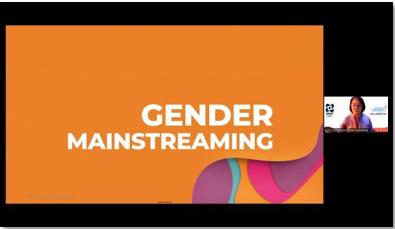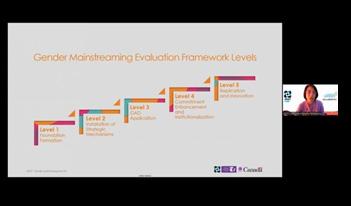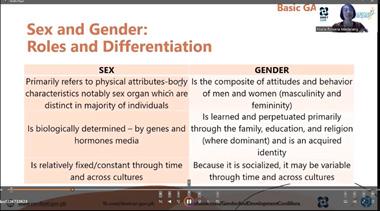
1 minute read
DOST-CAR conducts series of Webinars in Celebration of the Women’s Month
In celebration of Women’s Month, DOST-CAR through its Human Resource Unit conducted a webinar on the Gender Responsive Programs focused on the Gender Mainstreaming Evaluation Framework (GMEF) and Harmonized Gender and Development Guidelines (HGDG) on March 15, 2023 and Gender Sensitivity Training (GST) on March 20, 2023 for its employees.

Advertisement
Gender Responsive Programs through the Gender Mainstreaming Evaluation Framework (GMEF)

Maria Rowena C. Madarang, ARDFinance and Administrative Services, discussed that the goal of GMEF is to assess the gender mainstreaming status of the organization. With this, the Gender and Development Focal Point System (GFPS) members shall identify areas where the organization may improve to mainstream the Gender and Development (GAD) in the organization.
In addition, HGDG is a collection of analytical concepts and techniques, which was created to incorporate gender-sensitive issues in development initiatives and programs. It evaluates or reevaluates issues related to gender and development and makes sure that initiatives and programs reflect women’s empowerment and gender equality.
A workshop was conducted to fully understand the concepts of HGDG.
Through the orientation, the participants reached the attained outcomes, which included being able to perceive and comprehend the GMEF concept and subjecting the GIA guidelines to the HGDG.
Gender Sensitivity Training
(GST)
Gender sensitivity acknowledges that gender identity, roles, and expectations are social constructs that can be changed in order to prevent negative stereotypes and prejudices.

ARD-FAS Madarang, discussed Gender Sensitivity as a concept that refers to the recognition and understanding of the differences and inequalities between genders, and the promotion of gender equality and empowerment.
Gender sensitivity is important because gender-based discrimination and inequality continue to persist in many parts of the world, limiting the opportunities and freedoms of individuals based on their gender. Gender-sensitive approaches are needed to ensure that everyone, regardless of gender, has access to
■ JUSTIN KRIS SANTIAGO
education, healthcare, employment, and other basic rights.
One of the key goals of gender sensitivity is to promote awareness and understanding of gender issues, and to encourage individuals and organizations to take action to address them. This can involve challenging harmful stereotypes and attitudes, supporting policies and programs that promote gender equality, and empowering women and other marginalized groups.
Gender sensitivity can be promoted through a variety of means, including education, training, advocacy, and policy development. Gender sensitivity training, in particular, can be a valuable tool for promoting awareness and understanding of gender-related issues, and for building skills and knowledge around gender-sensitive practices and policies.
Overall, gender sensitivity is a crucial concept for promoting gender equality and empowerment, and for challenging harmful stereotypes and discrimination. By promoting awareness and understanding of gender-related issues, and by taking action to address them, we can build a more inclusive and equitable world for all genders.










